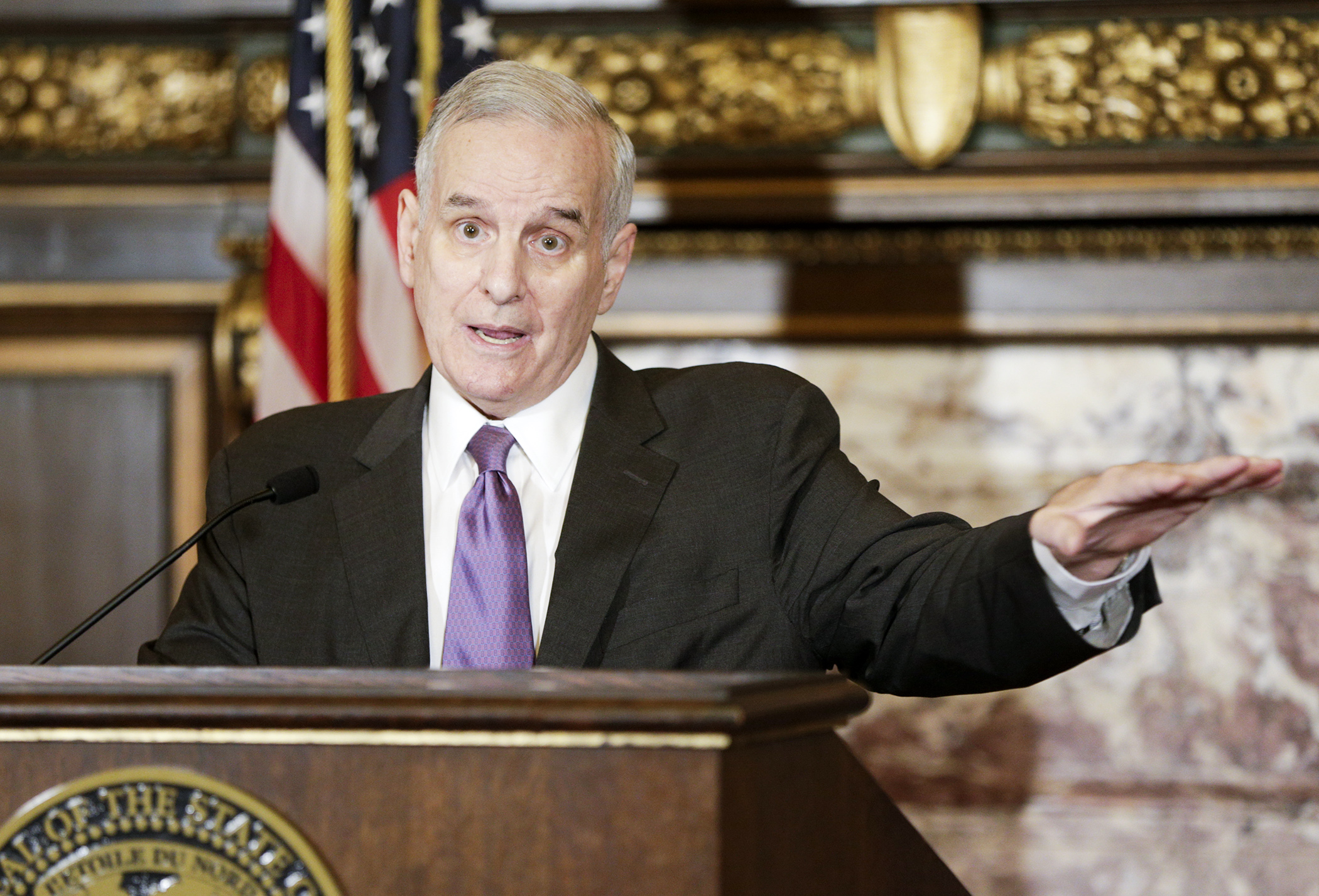Dayton wants a new transportation bill, criticizes reinsurance proposal
DFL Gov. Mark Dayton on Wednesday urged the Republican-controlled Legislature to authorize $105 million for stalled infrastructure projects, criticized lawmakers’ plans to fund a state-based reinsurance program and demanded responses from insurance providers he said don’t include Minnesotans in their best interests.
In a wide-ranging news conference, the governor said he wants the Legislature to approve a standalone funding bill for these statewide infrastructure projects instead of including it in an omnibus transportation finance bill. Dayton sent a March 21 letter to Sen. Scott Newman (R-Hutchinson) and Rep. Paul Torkelson (R-Hanska), the transportation chairs in their respective chambers, asking them to authorize $105 million in federal FAST Act funds “with no politically motivated amendments, earmarks or poison pill policy provisions.”
If the Legislature fails to approve the funding by the end of next week, Dayton said, it will “delay projects and could put federal funds in jeopardy.”
LISTEN: Hear the governor’s news conference
“These funds are literally sitting in a bank account when they could be used to put more people to work to improve our road and bridge infrastructure beginning this spring,” Dayton wrote in the letter. “Finish the work of your predecessors and pass a clean authorization bill to my desk by the end of March.”
Transportation Commissioner Charles Zelle joined Dayton in calling for a standalone transportation bill that would fund “bread and butter” improvement projects.
“This might go to other states that, frankly, are ready to go,” Zelle said.
No response, no reinsurance
 Gov. Mark Dayton speaks at a March 22 press conference about transportation funding and the reinsurance bill that awaits conference committee action. Photo by Paul Battaglia
Gov. Mark Dayton speaks at a March 22 press conference about transportation funding and the reinsurance bill that awaits conference committee action. Photo by Paul BattagliaThe governor also lambasted how lawmakers are funding a proposal to establish a state-based reinsurance program awaiting action by a conference committee.
HF5*/SF720, sponsored by Rep. Greg Davids (R-Preston) and Sen. Gary Dahms (R-Redwood Falls), intendeds to cut rising insurance premiums on the individual market by subsidizing the costs of high-risk customers, giving providers financial incentives to keep rates down.
Nonpartisan fiscal staff have said the proposal will cost $384 million in the 2018-19 biennium and have similar operating costs in ensuing biennia. Instead of funding the program through a combination of General Fund and Health Care Access Fund money, which the legislative proposal does, Dayton wants to tax the insurance industry.
“Those taxpayer dollars should be dedicated to statewide funding priorities like schools, early childhood education, health care for low-income Minnesotans, and other critical needs,” Dayton said in a second letter to Davids.
Saying he, the Legislature and taxpayers have “the right to know,” Dayton said he wouldn’t sign a reinsurance bill until he heard back from insurance providers on whether they would continue to operate in Minnesota. The governor sent letters to providers last week, asking them to commit to serving the state and reduce their rates.
So far, the non-response is drawing sharp criticism from the governor.
“These insurance companies are not demonstrating that they are in this market to serve the people of Minnesota, but they’re in it for their own financial benefit,” Dayton said. “And we have to make sure we’re protecting the people of Minnesota. We’re proposing some serious money to achieve that purpose.”
Related Articles
Search Session Daily
Advanced Search OptionsPriority Dailies
Legislative leaders set 2026 committee deadlines
By Lisa Kaczke Legislative leaders on Tuesday officially set the timeline for getting bills through the committee process during the upcoming 2026 session.
Here are the three deadlines for...
Legislative leaders on Tuesday officially set the timeline for getting bills through the committee process during the upcoming 2026 session.
Here are the three deadlines for...